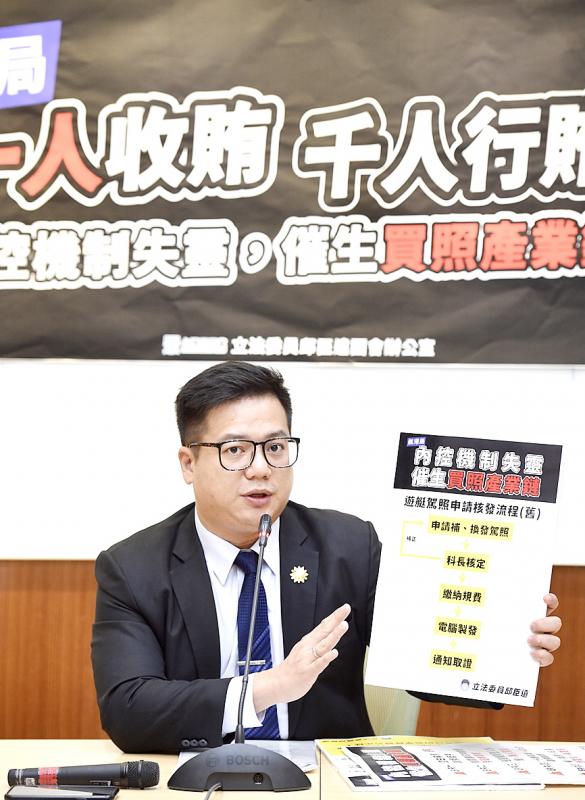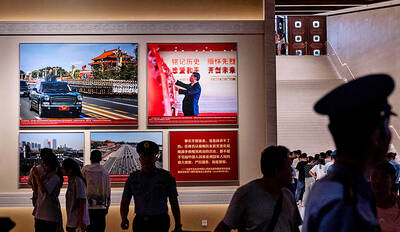Minister of Transportation and Communications Lin Chia-lung (林佳龍) yesterday promised a comprehensive review of the yachting license distribution system after an associate technician at the Maritime and Port Bureau was indicted last week for allegedly exploiting loopholes in the system and accepting bribes from people wanting to purchase licenses for more than 10 years.
Lin made the remarks at a meeting of the legislature’s Transportation Committee, where he had been asked to brief lawmakers on the case and the ministry’s plan to address the potentially systematic problem.
The Taichung District Prosecutors’ Office said that Sung Li-heng (宋立恒), 54, an associate technician at the bureau’s Central Maritime Affairs Center, was in charge of renewing yachting licenses and producing employment certificates for mariners between 1989 and last year.

Photo: Peter Lo, Taipei Times
Sung had authorization to log into the bureau’s Marine Technician Management System, the prosecutors’ office said.
People wanting an operating license for a yacht or a small power-driven vessel must undergo training and pass a test to be issued a license, the office said.
However, investigators found that people who did not want to train or take a test would pay brokers NT$10,000 to NT$30,000 to get them a license, the office said, adding that Sung received NT$5,000 to NT$8,000 for every license he produced for the brokers.
Taiwan People’s Party Legislator Andy Chiu (邱臣遠), one of the conveners of the committee, said the scandal showed that the bureau’s internal control mechanism was riddled with loopholes.
“The bureau had the same person reviewing yachting license applications and issuing licenses over the past decade, and he could use the agency’s official seal and print out licenses without any oversight from his superiors,” Chiu said, adding that the ministry should also turn the case over to the Control Yuan for further investigation.
Democratic Progressive Party Legislator Lin Chun-hsien (林俊憲) said he doubted the case was an isolated incident.
Sung only handled the renewal and changing of yachting licenses, and did not issue new licenses, but the management system enabled him to enter a fake license number to produce a new license, he said.
This exposed errors with the management system and explained why the alleged crime could continue for years without being discovered, Lin Chun-hsien said.
Some people would rather pay to obtain a license because the test is too difficult, he said, adding that the bureau should change the test as well.
Lin Chia-lung said that the bureau has been complying with the prosecutors since April last year, adding that Sung was suspended for two years after he was indicted last week.
His superiors now face administrative penalties as well, he said.
The Maritime and Port Bureau became responsible for issuing yachting licenses after the now-dissolved Taiwan Provincial Government was downsized in 1998, the bureau said, adding that Sung was given authorization to import the data and information stored during the provincial government era.
“We have found that there are about 2,300 questionable yachting licenses, and about 95 percent were produced by Sung,” Lin Chia-lung said, adding that the bureau has not found any accomplices.
Bureau Director-General Yeh Hsieh-lung (葉協隆) said that prosecutors had charged Sung and 50 other people, adding that the bureau has revoked 18 yachting licenses.
To prevent similar incidents, the bureau would limit the authority of personnel issuing yachting licenses, and they would rotate jobs every three years, Yeh said.

Three batches of banana sauce imported from the Philippines were intercepted at the border after they were found to contain the banned industrial dye Orange G, the Food and Drug Administration (FDA) said yesterday. From today through Sept. 2 next year, all seasoning sauces from the Philippines are to be subject to the FDA’s strictest border inspection, meaning 100 percent testing for illegal dyes before entry is allowed, it said in a statement. Orange G is an industrial coloring agent that is not permitted for food use in Taiwan or internationally, said Cheng Wei-chih (鄭維智), head of the FDA’s Northern Center for

The Chinese military has built landing bridge ships designed to expand its amphibious options for a potential assault on Taiwan, but their combat effectiveness is limited due to their high vulnerability, a defense expert said in an analysis published on Monday. Shen Ming-shih (沈明室), a research fellow at the Institute for National Defense and Security Research, said that the deployment of such vessels as part of the Chinese People’s Liberation Army (PLA) Navy’s East Sea Fleet signals a strong focus on Taiwan. However, the ships are highly vulnerable to precision strikes, which means they could be destroyed before they achieve their intended

About 4.2 million tourist arrivals were recorded in the first half of this year, a 10 percent increase from the same period last year, the Tourism Administration said yesterday. The growth continues to be consistent, with the fourth quarter of this year expected to be the peak in Taiwan, the agency said, adding that it plans to promote Taiwan overseas via partnerships and major events. From January to June, 9.14 million international departures were recorded from Taiwan, an 11 percent increase from the same period last year, with 3.3 million headed for Japan, 1.52 million for China and 832,962 to South Korea,

REWRITING HISTORY: China has been advocating a ‘correct’ interpretation of the victory over Japan that brings the CCP’s contributions to the forefront, an expert said An elderly Chinese war veteran’s shin still bears the mark of a bullet wound he sustained when fighting the Japanese as a teenager, a year before the end of World War II. Eighty years on, Li Jinshui’s scar remains as testimony to the bravery of Chinese troops in a conflict that killed millions of their people. However, the story behind China’s overthrow of the brutal Japanese occupation is deeply contested. Historians broadly agree that credit for victory lies primarily with the Chinese Nationalist Party (KMT)-led Republic of China (ROC) Army. Its leader, Chiang Kai-shek (蔣介石), fled to Taiwan in 1949 after losing a